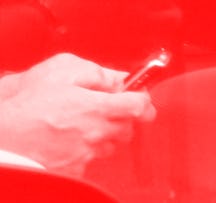A New York private detective discovered a special skill for exposing ‘spirit fraud’, and caught the eye of the world’s most famous illusionist. Recruited as one of Houdini’s undercover psychic investigators, Rose Mackenberg exposed the fraudulent mediums who would exploit grief for their own financial gain.
Rose Mackenberg’s deceptive activism
Words by A R Hopwoodaverage reading time 6 minutes
- Serial

One possible justification for using deception as an activist strategy is the ‘punching up’ defence – targeting powerful (rather than susceptible) groups or people. Groups that use deception creatively, such as those explored in part one of this series like the Yes Men, can be justified by their ability to enlighten the public about the underhand use of deceit by those in positions of power. Despite my concerns about some of their methods, the Yes Men’s targets are major organisations, governments and corporations that have a genuine impact on our lives.
The roots of this kind of deceptive activism can be traced to the tradition of the magician-investigator. John Neville Maskelyne, Harry Houdini and Joseph Dunninger all infiltrated séances to reveal fraudulent mediums, while James Randi used covert, deceptive techniques to expose poor methodology in the parapsychology lab.
More recently, Derren Brown has presented performances where the paranormal is seductively evoked, but then clearly revealed to be just a trick, in order to debunk supernatural explanations for such effects. These stage magicians have all shared a moral mission to educate the public about the misuse of trickery by those claiming to be channelling special powers. It is also worth acknowledging at this point (in case you hadn’t noticed) that they’re also all men.
More: How the magician's assistant creates the illusion.
Who was Rose Mackenberg?
In fact, though under-acknowledged, women do have a place in this tradition. Rose Mackenberg campaigned vociferously against psychic trickery alongside her male magician counterparts.
Growing up in New York in the early years of the 20th century, Mackenberg, like many others, had developed a belief in spiritualism in light of the devastating impact of the First World War and the Spanish flu pandemic. However, as a private detective she became aware of how such beliefs could be manipulated through trickery when she started investigating a ‘spirit fraud’ for one of her clients. After impressing Houdini with her rigorous, unblinkered work on the case, she was invited to become one of his undercover psychic investigators.
She would then attend local séances in disguise, often playing the role of the vulnerable grieving widow.
The team would be dispatched in towns and cities to investigate the tricks of some mediums and psychics in the local area, which Houdini would then reveal in his touring stage show. Mackenberg was one of the best: she was resourceful, logical, creative and witty, and knew how to get results.
She developed a method whereby she would observe the characteristics of the women most likely to attend a sitting in a particular area, and then create a character and pseudonym based on those observations. She would then attend local séances in disguise, often playing the role of the vulnerable grieving widow.
Thanks to Houdini’s tutoring she had become an expert conjurer, so she had the necessary skills to expose foul play, which she would reveal in hilarious, lurid reports in popular magazines and newspapers.
In one example, Mackenberg exposed the self-proclaimed spiritualist pastor Herman E Parker from Chicago as a fraud. Dressed as a dour local widow called Mrs Rosalind Richards, she visited Parker for a private sitting to see if he could contact her (fictional) deceased husband. Sure enough, after falling into a ‘trance’, Parker managed to bring him forth.
An ability to contact non-existent family members was a fairly typical finding from such investigations. However, Mackenberg wanted to probe further: what else was Parker doing to his vulnerable clients?
Rose Mackenberg ready to pose as a ‘believer’ at a séance.
Just as Parker was bringing her sitting to a close, Mackenberg let slip, through crocodile tears, that she (as Richards) needed to ask her husband whether she should accept the $3,000 ‘settlement’ for his death. Suddenly Parker took a renewed interest and asked the spirit for advice.
Remarkably, he recommended taking the money and investing $1,000 in a company called Wilcox Transportation Company. It just so happened that Parker had created the company with a confederate. Mackenberg played along, gathered evidence and then presented her findings to the Investors Protective Bureau. Parker and his long-running accomplice John F Wilcox were tried and found guilty of fraud.
Mackenberg had used deception, method acting, misdirection and trickery to prove a malign fraud, while educating the public about a form of deception that she felt was unethical by writing about her experiences in the popular press. Her investigative work took her around the world and she worked on hundreds of cases over a 30-year period.
Although she became gradually more sceptical about spiritualism, she didn’t question that there were many honest, sincere believers. Their genuine faith was not the object of her ire. It was the dishonest manipulators who would do anything for financial or personal gain that she wanted to confront.
Punching up or down?
But were Mackenberg and the powerful Houdini really ‘punching up’ at their intended targets? What kind of influence did fraudulent mediums of the period really have? If those paying to see a psychic find spiritual catharsis, then why should it be a problem if some of them are being unwittingly fooled?
The psychic investigator Julien Proskauer estimated by that by 1932, 30 million people per year were falling foul of medium hoaxes, with losses of $125 million ($2.15 billion in 2019). This, then, was no fringe activity, but a powerful industry with vested interests.
Mackenberg was also instrumental in revealing that prominent members of the Senate had regularly visited discredited mediums in Washington, and that President Coolidge had conducted séances at the White House – accusations that were vehemently denied during a house committee reading of an ultimately unsuccessful anti-fortune-telling bill promoted by Houdini.
Newspaper clipping featuring seven images side by side of Rose Mackenberg in different disguises: Rustic Schoolteacher, Small-Town Matron, Credulous Servant Girl, ‘Believing’ Semi-Invalid, a Woman Seeking Lost Relatives, a ‘Vamp’ from the Country, a Tipsy Consultant.
The idea that we need to be unknowingly duped to find spiritual catharsis was a notion that Mackenberg and Houdini felt instinctively opposed to – particularly when heartfelt grief was at the centre of the manipulation. Their debunking activity wasn’t about belittling spiritualists – instead they wanted hopeful customers to approach their faith with eyes wide open, armed with the knowledge that their beliefs could be easily exploited by unscrupulous fraudsters.
A psychic-service growth industry
After over 120 years of research, mainstream science still rejects the idea that humans have hidden psychic powers. Over the same period of time stage magicians have been demonstrating consistently that they can replicate such illusory powers through trickery alone. Despite this, a 2018 study concluded that psychic services in the US had grown by 52 per cent since 2005 and that they are now worth $2.2 billion per year.
Dedicated websites, TV stations, magazines and Gwyneth Paltrow’s popular lifestyle brand Goop all offer mediumistic and psychic services (at a price), and contemporary mediums still play to packed theatres across the UK.
There has also recently been a growth in millennials seeking solace in astrology, and an upsurge of occult beliefs – something that is often attributed to living in what are undoubtedly uncertain times. But before we seek catharsis in what we perceive as a more esoteric alternative to the status quo, it’s worth remembering that our beliefs can be manipulated by those who carry their own weight of exploitative authority.
About the author
A R Hopwood
A R Hopwood is an artist and Wellcome Trust Engagement Fellow. He has collaborated extensively with psychologists to create art projects about memory, belief and misdirection, including WITH (withyou.co.uk) and the False Memory Archive. He was co-curator of ‘Smoke and Mirrors: The Psychology of Magic’ at Wellcome Collection in 2019.


